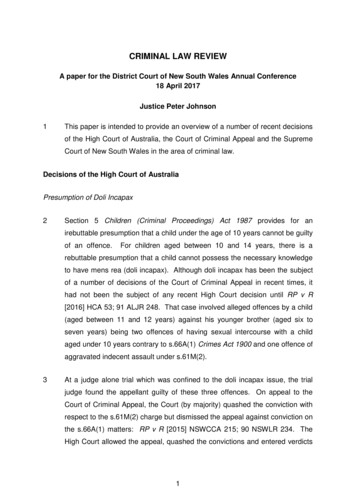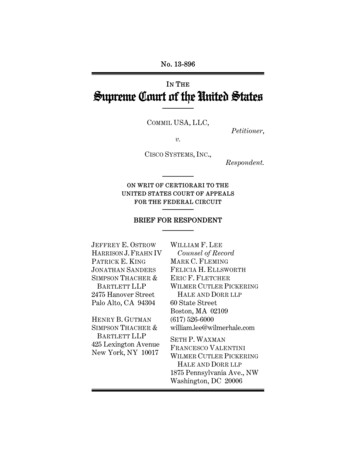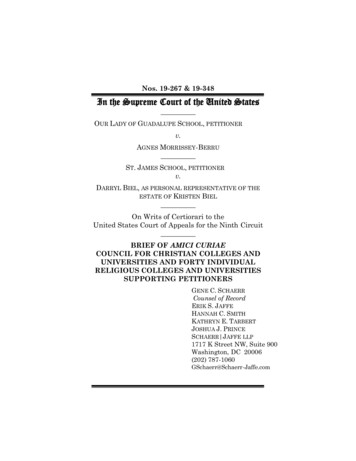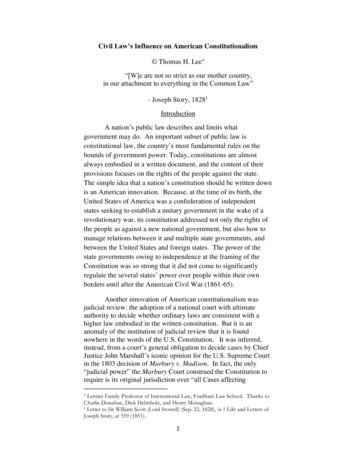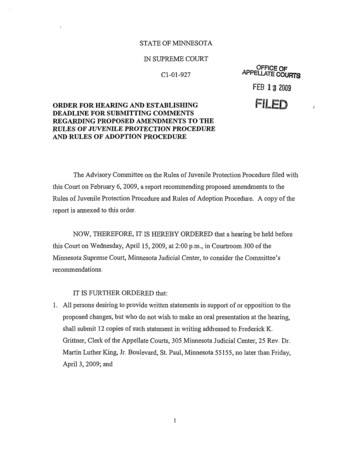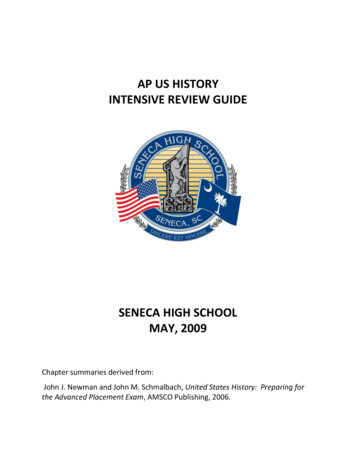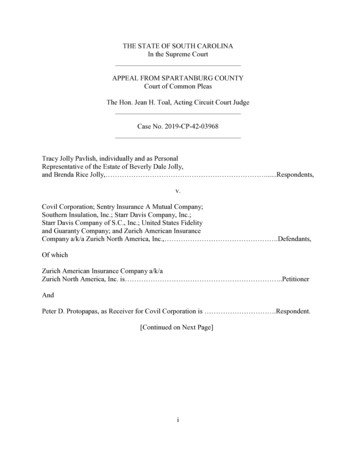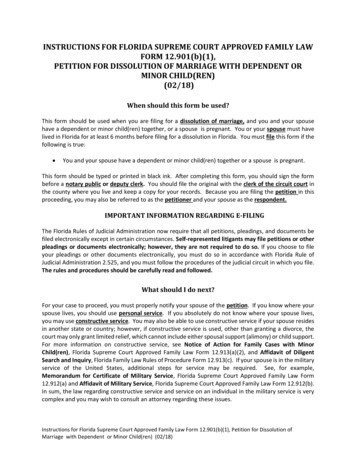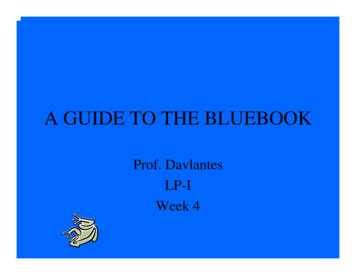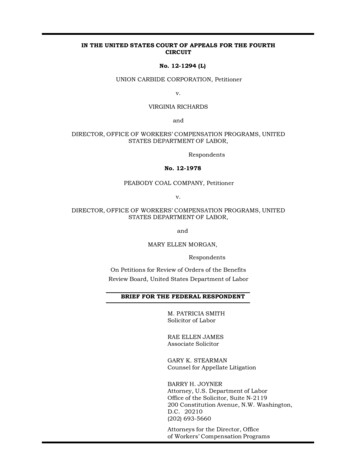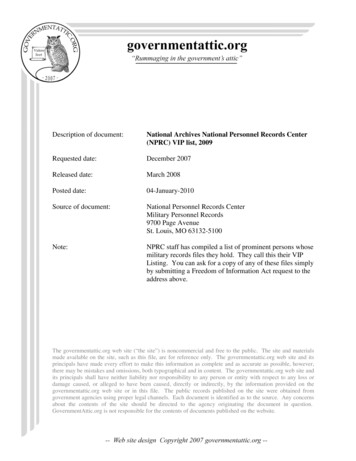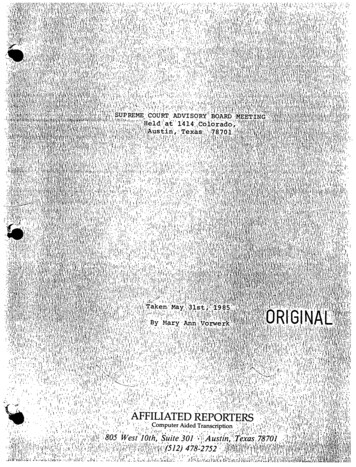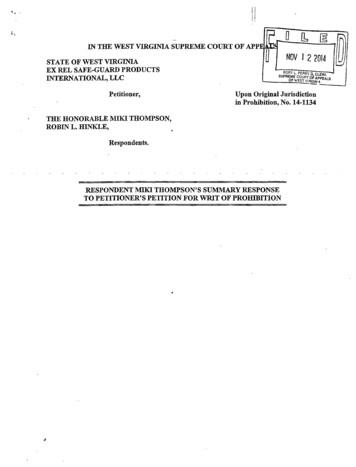
Transcription
L.IN THE WEST VIRGINIA SUPREME COURT OF APP'liSTATE OF WEST VIRGINIAEX REL SAFE-GUARD PRODUCTSINTERNATIONAL, LLCr;:J0 11 NOVT1 -- J(g2 2014RORY l. PERRY 11. CLERK SUPREME COURT OF APPEALSOF "'EST VIRGIN' --Petitioner,Upon Original Jurisdictionin Prohibition, No. 14-1134THE HONORABLE MIKI THOMPSON,ROBIN L. HINKLE,Respondents.RESPONDENT MIKI THOMPSON'S SUMlVIARY RESPONSETO PETITIONER'S PETITION FOR WRIT OF PROHIBITIONr
·.OUESTIONS PRESENTED1. Whether the Circuit Court clearly erred as a matter of law in fmding that the Safe-GuardGuaranteed Asset Protection Plan ("GAP Agreement") was "insurance" under West VirginiaCode § 33-1-1 et seq.STANDARDArticle VIII, § 3 of the West Virginia Constitution grants the Supreme Court of Appealsoriginal jurisdiction in prohibition. Pursuant to West Virginia Code § 53-1-1, "The writ ofprohibition shall lie as a matter of right in all cases of usurpation and abuse of power, when theIinferior court has not jurisdiction of the subject matter in controversy, or, having suchjurisdiction, exceeds its legitimate powers."Traditionally, writs of prohibition are used primarily to challenge jurisdiction of lowercourts, and are used as an extraordinary remedy, to be rarely granted only when a lower courtabuses its legitimate powers. See, generally, State ex rel. State Of West Virginia Dept. ofTransp.,Div. Of Highways v. Cookman, 639 S.E.2d 693, 219 W.Va. 601 (2006), State ex rel. Sexton v.Vickers, 619 S.E.2d 215, 217 W.Va. 702 (2005), and State ex rel. Bell & Bands, PLLC v.Kaufman, 584 S.E.2d 574, 213 W.Va. 718 (2003).Finally, "A writ of prohibition may not be used as a substitute for writ of error, appeal, orcertiorari." State ex rel. Brooks v. Zakaib, 609 S.E.2d 861, 216 W.Va. 600 (2004).ARGUMENTPursuant to Rule 16(h) R.A.P., Respondent respectfully requests this Honorable Courtdismiss Petitioner's Writ of Prohibition without oral argument. Specifically, the Petition is notappropriate for review and the lower court did not clearly err as a matter oflaw in its October 16,2014 order (attached hereto and incorporated as Exhibit A). Petitioner erroneously states in its2
Petition that Respondent, in the October 16, 2014 order, ruled that all debt cancellationagreements are to be regulated as "insurance" under West Virginia law. This order clearly statesthat GAP Agreements, not all debt cancellation agreements, are to be regulated as "insurance" inWest Virginia.A. Petitioner's Petition for Writ ofProhibition request for relief is premature.The case related to the instant Petition is currently set for trial in the Circuit Court ofMingo County for the 4th day of December, 2014. The Petitioner admits on pages twenty-six (26)and twenty-seven (27) of its Petition that it seeks a ruling by your Court on this issue before trialso that it will not have to appeal an adverse decision after trial in the future. The Supreme Courtin State ex. ReI Brooks v. Zakaib, supra, ruled that a writ of prohibition may not be used as asubstitute for an appeal. The Petitioner, thus, is inappropriately and prematurely attempting havethe highest court in West Virginia resolve the issue of whether Safe-Guard's GAP Agreement is"insurance" under West Virginia law.Under the five factor test outlined in State ex reI. Hoover v. Berger, 199 W. Va. 12,483S.E.2d 12 (1996), 1 only factor five has any apparent relevance to the -issue raised by thePetitioner. Regarding the first factor of the Berger test, the Petitioner, should it have an adversejudgment at trial, would have adequate means to obtain its requested relief. Further, if thePetitioner's outcome at trial is favorable, they have no reason to appeal.1 "In determining whether to entertain and issue the writ of prohibition for cases not involving an absence ofjurisdiction but only where it is claimed that the lower tribunal exceeded its legitimate powers, this Court willexamine five factors: (1) whether the party seeking the writ has no other adequate means, such as direct appeal, toobtain the desired relief; (2) whether the petitioner will be damaged or prejudiced in a way that is not correctable onappeal; (3) whether the lower tribunal's order is clearly erroneous as a matter oflaw; (4) whether the lower tribunal'sorder is an oft repeated error or manifests persistent disregard for either procedural or substantive law; and (5)whether the lower tribunal's order raises new and important problems or issues of law of first impression. Thesefactors are general guidelines that serve as a useful starting point for determining whether a discretionary writ ofprohibition should issue. Although all five factors need not be satisfied, it is clear that the third factor, the existenceof clear error as a matter of law, should be given substantial weight." Syllabus Point 4, State ex reI. Hoover v.Berger, 199 W.Va. 12,483 S.E.2d 12 (1996).3
Regarding the second factor, the Petitioner argues that it will be damaged and/orprejudiced. In this instance, the Petitioner prematurely decides it will be damaged or prejudiced.In doing so, the Petitioner assumes that it will receive an adverse judgment at trial. While it is notrequired that the Petitioner first go through trial before seeking a writ ofprohibition,2 Petitioner'sprediction is inappropriate given the lack of factual findings on the record in the related case, arole reserved for the jury at trial.B. Safe-Guard's GAP Agreement is "Insurance" Under West Virginia Law.Under the Berger test, the third factor, whether the lower court's order is clearlyerroneous as a matter of law, is given the most weight. The Petitioner admits there is no clearguidance from your Honorable Court regarding the issue. It also attempts to mischaracterize thelower court's October 16, 2014 order as applying to all debt cancellation agreements. Whilecourts in several states have found that debt cancellation agreements should not be regulated as"insurance," the Southern District of West Virginia in Justice v. BB&T, 2009 U.S. Dist. LEXIS24668 (S.D.W. Va. 2009) found that nothing in either federal law or the law of West Virginiaprecludes a finding that certain debt cancelhition agreements constitute an insurance product.Further, no cases throughout other states the deal specifically with the issue of whetherGAP Agreements should be regulated as insurance. The Petitioner, without providing therelevant cases in its briefs to the lower court or the instant Petition, argues that the majority ofstates do not regulate debt cancellation agreements as insurance. It does, however, assert that theWest Virginia Office of the Insurance Commissioner, in informational letter no. 171, fmds thatdebt cancellation agreements are not insurance. This is incorrect. The informational letter refers2 "A party seeking relief by prohibition is not required, as a prerequisite to his right to proceed by prohibition, first togo through a trial or hearing in the lower court or tribunal." State ex reI. City ofHuntington v. Lombardo, 143 S.E.2d535, 541, 149 W. Va. 671, 679, (1965), citing State, etc. v. Muntzing, 146 W.Va. 349, 359, 120 S.E.2d 260, 266(1961).4
specifically to fmancial services relating to the banking industry. It in no way contemplates GAPAgreements sold to purchasers of automobiles, such as the one at issue in the instant Petition.The lower court's October 16, 2014 order makes several conclusions of law, none ofwhich meet the "clearly erroneous" standard required for review of the instant Petition.Specifically, the lower court found:24.West Virginia Code § 33-1-1 defines insurance as "a contractwhereby one undertakes to indemnify another or to pay a specified amount upondeterminable contingencies."25."Indemnity" is defined as "a duty to make good any loss, damage,or liability incurred by another." Black's Law Dictionary, 9th Ed. 2009. Likewise,"indemnify" means: (a) to reimburse for a loss suffered because of a third party'sor one' own act or default, (b) to promise to reimburse for such a loss, and (3) togive security against such a loss. Black'sLaw Dictionary, 9th Ed. 2009.26."Generally, an insurance policy sets forth an agreement betweenparties whereby the insured agrees to pay a specified premium, and;·in exchange,the insurer agrees to indemnify the insured against the type of losses contemplatedwithin the terms of the policy yet unknowable at its issuance." McDaniel v.Kleiss, 503 S.E.2d 840,846 (W.Va. 1998).27."In construing a contract of indemnity and determining the rightsand liabilities of the parties thereunder, the primary purpose is to ascertain andgive effect to the intention of the parties." Syl. Pt. 2, Sellers v. Owens-illinoisGlass Co., 191 S.E.2d 166 (W.Va. 1972).5
28.The Court FINDS that the "GAP Insurance" agreement describesitself as a Safe-Gap Total Loss Protection Plan and does not state that it isinsurance. However, the agreement operates as insurance and was represented byMr. Waugh to be insurance. Moreover, the parties in the hearing acquiesced toand/or adopted the terms "GAP Insurance" and/or "GAP Plan" in attributing aname to the agreement at issue.29.The Court FINDS that in exchange for the four-hundredninety five dollar ( 495) premium, the "dealer/assignee" would indemnify the Plaintiffupon the event her vehicle would be rendered a total loss.30.The Court FINDS that "reimbursement" or "compensation"includes more than just a payment of moneys. It includes a waiver of debt in the"GAP Insurance" agreement at issue.31.The Court further FINDS that the "GAP Insurance" agreementconstitutes "insurance" under W. Va. Code § 33-1-1 et seq.See Exhibit A, p. 11-12.In making these findings, the lower court in no way ignores constitutional, statutory, orcase law, usurps power, or abuses its power. The Petitioner, thus, has not shown that the lowercourt's October 16, 2014 order is clearly erroneous as a matter oflaw.C. Factors Four and Five o/the Berger Test Do Not Warrant Review o/Petitioner'sPetition/or Writ 0/ Prohibition.The lower court's October 16,2014 order fmding that Safe-Guard's GAP Agreement isinsurance under West Virginia law is not an oft-repeated error, nor does it manifest persistentdisregard for procedural or substantive law. The lack of legal guidance regarding debtcancellation agreements, the vast majority of which are not GAP Agreements, such as the one at6
issue, is indicative of the rarity such agreements become an issue under West Virginia law. Onecan speculate why GAP Agreements do not regularly present legal issues, but this is not theappropriate forum for such speculation.Finally, the only factor in the Berger test that may have any bearing on your HonorableCourt's decision is factor five: whetherth lower court's order raises new and importantproblems or issues of law of first impression. It is true that the question presented in the instantPetition is one of first impression. Because consideration of the other four factors suggests thatthe instant Petition does not merit review by your Honorable Court, however, the Respondentrequests that this Court denies the instant Petition.CONCLUSIONWHEREFORE, Respondent Miki Thompson prays that this Court denies Petitioner'sPetition for Writ of Prohibition, or, in the alternative, fmds that Safe-Guard's GAP Agreement is"Insurance" Under West Virginia Law.Respectfully submitted on this the ay of November, 2014.Respondent,Williamson, WV 2Phone: (304) ,235-0343Fax: (304) 235-03427
IN THE CIRCUIT COURT OF MINGO COUNTY, WEST VIRGINIAROBIN L. HINKLE,Plaintiff,Civil Action No.: 12-C-202Judge Moo Thompsonv. '-;CASEY JOE MATTHEWS, et aI.,. '- r -;.;--IDefendants.···i-,.ORDER,)':.'j0 lJ.F. (On the 21 st day of August 2014, came the Defendant, Santander Consurner,tUSA;w'Inc. ("Defendant Santander"), by and through counsel, Daniel J. Konrad, and thePlaintiff, Robin L. Hinkle, by and through counsel, Howard M. Persinger, III, forarguments on Defendant Santander's Motion for Summary Judgment and PlaintiffsMotion for Partial Summary Judgment, pursuant to Rule 56 of the West Virginia Rules ofCivil Procedure, pertaining to Plaintiffs claims for breach of contract, violation of WestVirginia's Unfair Trade Practices Act, WV Code § 33-11-1 et seq., common law badfaith, declaratory judgment, and punitive damages.The Motions have been fully briefed and after hearing the arguments of theparties, by counsel, and reviewing the record in this case, relevant statutory authority, andcase law, the Court hereby DENIES IN PART and GRANTS IN PART Defendant'sMotion and GRANTS Plaintiffs Motion, based on the following findings of fact andconclusions of law, to-wit:EXHIBITj'A
I. Findings of Fact1. On July 14, 2006, Plaintiff and the Defendant, Johnny L. Hinkle ("DefendantHinkle" and Plaintiff's fonner husband), purchased a 2006 Monte Carlo (the "vehicle")from C&O Motors, Inc. (the "dealership") in St. Albans, West Virginia. The Hinklesfinanced the purchase of said vehicle by entering into a Retail Installment Contract andSecurity Agreement with the dealership, which provided for a total vehicle price oftwenty-thousand five-hundred fifty-two dollars and seventy cents ( 20,552.70) withnineteen-thousand seven-hundred eighteen dollars and twenty cents ( 19,718.20) to befinanced over a period of seventy-two (72) months at a yearly annual percentage rate offourteen and one-quarter percent (14.25%) with monthly payments of four-hundredeleven dollars and seventy-eight cents ( 411.78).2. The name of the salesman employed by the dealership who sold the Hinkles thevehicle was Paul L. Waugh.3. During the course of the purchase, the Hinkles were asked by Mr. Waugh ifthey wanted to purchase "GAP Insurance" (AKA a "Safe-Gap Total Loss ProtectionPlan") for an additional four-hundred ninety-five dollars ( 495) and the Hinklespurchased said "GAP Insurance" on July 14; 2006.4. The "GAP Insurance" was marketed by. Defendant Safe-Guard ProductsInternational, LLC ("Defendant Safe-Guard").5. "GAP Insurance" is also known as a "Guaranteed Asset Protection Plan" or a"deficiency waiver addendum."6. The general purpose of "GAP Insurance" is to relieve payment of the amountowed on a vehicle if it is ever totaled and more was owed for the vehicle than its value.2
,1,7. The Plaintiff testified that, at the time of the sale, Mr. Waugh was rushing herand her husband by ''throwing all these documents at us and saying . here read them ." She further stated, "it was late in the day, it was raining, it was time to close, and if Iremember correctly I looked over [the GAP Insurance Agreement] really quick and that'sall." Plaintiff also testified that she asked questions of Mr. Waugh, including asking forclarification on the point of "if there was an accident . whatever the insurance didn'tpay, we wouldn't owe any more money on the loan," to which Mr. Waugh responded toher, "yes, that is what it does."8. On the first page of the "Gap Insurance" agreement, under "Coverage," thecontract provides:The named Customer is responsible to the named Dealer/Assignee underthe terms of the described Installment Sales ContractILoanlLeaseAgreement for the amount of any early termination liability resulting froma Total Loss of the Vehicle. Due to this Addendum being in effect, theDealer/Assignee agrees to cancel a portion of the Customer's indebtednessin the event ofa Total Loss of the Vehicle as defined herein.The Deficiency Waiver Addendum will waive the amount equal to theUnpaid Net Balance less the Actual Cash Value (ACV) of the Vehicle,both as defmed herein, subject to the ACV not having been reduced bymore than 1,000 as a result of the application of the Customer's primaryinsurance deductible. Any deductible amount in excess of 1,000 remainsthe Customer's responsibility. There is no deductible coverage availablefor (a) vehicles fmanced or leased in Arkansas or (b) vehicles leased inIllinois. It is further agreed that the maximum claim payment is limited to 50,000.9. The Definitions section of the "GAP Insurance" agreement defmes Actual CashValue to mean " .the retail value of the covered vehicle on the Date of Loss, prior to itsphysical damage or theft, as determined by the primary insurance carrier."3
to. The Definitions section of the "GAP Insurance" agreement defines Total Lossto mean"0 a total or constructive total loss as defmed by the individual Customer'sprimary automobile physical damage carrier."11. The Definitions section of the "GAP Insurance" agreement defines UnpaidNet Balance to mean:[T]he amount owed by the Customer to clear the outstanding InstallmentSales ContractILoanlLease account as of Date of Loss subject toParagraph 2(b). This Amount shall not include any and all unearned and/orfuture interest or rental charges, finance or lease charges, late charges,delinquent payments, deferred payments, uncollected service charges,refundable prepaid taxes and fees, disposition fees, termination fees,penalty fees or any proceeds which may be recovered by canceling anyinsurance coverages, service contracts and/or warranties, credit life,accident and health insurance or other cancelable items.12. The Plaintiff testified that when she later looked over the documents she hadsigned, she was unable to comprehend the undefined technical language terms containedin the definition of Unpaid Net Balance.13. On April 23, 2013, Plaintiffs counsel took the deposition of Gary W. Volino,the Chief Operating Officer of Defendant Safe-Guard, who was offered by Safe-Guard asits corporate representative in response to Plaintiff's Notice of Deposition.14. Mr. Volino testified that, generally, following a financed sale of a vehicle, thedealer assigns or transfers the "loan package," which would include a purchased SafeGAP Total Loss Protection Plan (AKA "GAP Insurance") to a third-party lender whothen assumes the loan in tum for a cash payment to the dealer.15. The "GAP Insurance" amount was added to the total amount financed by theHinkles and thus became part ofthe "loan package."4
16. Upon the execution of the Retail Installment and Security Agreement (the"note" and part of the "loan package"), City Financial Auto Credit, Inc. ("Citi") was tobecome the holder of the note.17. Subsequently, Citi assigned its right in the Note to Defendant Santander, andDefendant Santander began servicing the note.18. On June 1, 2011, Plaintiff was involved in an automobile accident withDefendant Casey Matthews ("Defendant Matthews"), in which the Vehicle was rendereda total loss by State Fann Mutual Automobile Insurance Company ("State Fann"),Plaintiff's primary automobile insurance carrier.19. At the time of Plaintiff's accident, Plaintiff owed a balance on the vehicle inthe amount of eleven-thousand nine-hundred eighty-three and eighty-one cents( 11,983.81).20. As a result of the vehicle being totaled, State Farm remitted the amount ofseven-thousand two-hundred eighty-five and fifty cents ( 7,285.50) to DefendantSantander in satisfaction of the insurance claim for loss of property, leaving a deficiencybalance on the note of four-thousand six-hundred ninety-eight and thirty-one cents( 4,698.31 )(the "deficiency").21. The Plaintiff subsequently contacted Defendant Safe-Guard and submitted aclaim to cover the deficiency. Coverage under the "GAP Insurance" agreement wasdenied by Defendant Safe-Guard due to delinquent payments, deferred payments, andlate charges she incurred during the life of the note.5
\,.',22. The note was later re-amortized to five-thousand two-hundred eighty-threeand sixty-eight cents ( 5,283.68) to reflect what the balance of the note would have beenhad there been no delinquent payments, deferred payments, or late charges.23. Defendant Santander subsequently denied coverage under the "GAPInsurance" agreement.24. In its Motion for Summary Judgment, Defendant Santander argues, inter alia,that it is not obligated or bound by the terms of the "GAP Insurance" agreement becauseit is a subsequent assignee of the original Inst
Safe-Guard's GAP Agreement is "Insurance" Under West Virginia Law. Under the Berger test, the third factor, whether the lower court's order is clearl
